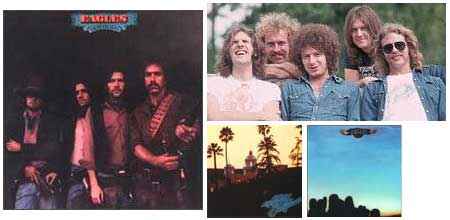The Eagles

Synopsis of Pop Music
"On a dark desert highway, cool wind in my hair..."
In the early 70’s, Los Angeles’ asphalt veins coursed with ambitious folk rock musicians and a vibrant club scene. Throw Linda Ronstadt and a little Southern California heat into that mix, and interesting things are sure to brew—the Eagles were just one of them.
The band's inception was one of those good old-fashioned L.A. melting pot situations: Glenn Frey had been in the band Longbranch Pennywhistle with J.D. Souther (and both shared a house with Jackson Browne); Don Henley harkened from a Texas group called Shiloh, which came westward thanks to its patron saint, Kenny Rogers; Randy Meisner was a founding member of L.A.’s popular Poco; and Bernie Leadon was a guitarist in the Flying Burrito Brothers.
Spending a fair share of their time at the famous Sunset Boulevard club the Troubadour, the boys were assembled by a record producer friend for a stint as Ronstadt’s backing band on her self-titled album and subsequent tour. The paychecks were steady, but they dreamed of doing something of their own, and with Ronstadt’s blessing, they eventually left to do just that.
Choosing a name that was simultaneously tough and mythic and reverently Beatles-esque, they signed with David Geffen’s Asylum Records label and left the Southern California roost for London. There, they recorded their eponymous (and very successful) 1972 debut album, which spawned Top-40 singles “Witchy Woman,” “Take it Easy” and “Peaceful Easy Feeling.”
The following year’s Desperado emphasized a country sound and didn’t sell as well as their debut, so the band hired a new producer named Bill Szymczyk and replaced Geffen with Irving Azoff. This collaboration produced On the Border, which had a sound with less country and more rock. Session slide guitarist Don Felder so impressed the rest of the guys during Border's recording that he was asked to come aboard permanently.
The making of 1976's Hotel California was long and tense. Leadon disappeared once for three days after announcing he was going surfing, and then later poured a beer on Frey’s head during a row. He would soon quit the band, to no one’s great surprise, and Joe Walsh (former leader of the James Gang) joined up in his place. All the tension and tumult aside, this album’s title track, all six and a half minutes of it, with its twin guitar solos and its 'sing ‘em if you know ‘em' lyrics, became the band’s most well-known hit. And for those of you not up on your California flora and fauna: 'colitas' (as in the “warm smell of…”) is a desert flower. Now you know.
After the Hotel tour, Meisner quit. Tim Schmit, whom Frey knew from Longbranch Pennywhistle, took his place, just like he took Meisner's place in Poco years before. Trying to follow up Hotel California's enormous success properly, the band hit the studio in 1978 to begin work on The Long Run—which is exactly what the production became. But when the long-in-the-making album finally did enter the charts in the fall of ’79, “Heartache Tonight” went #1, and the record, the Eagles’ last studio effort, went gold. Though they did tour, nerves were frayed, and the idea of recording again wasn't at all enticing. So in 1980, the Eagles broke up, though manager Azoff didn’t announce their demise until 1982.
Since Henley had been quoted as saying the Eagles would reunite when hell froze over, the name of their 1998 tour was an homage to that cynicism. The Hell Freezes Over Tour featured the band’s late period line-up, with Walsh and Schmit, and was one of the most successful reunion tours of all time. A live album of the same title hit record stores in 1994.
The Eagles sold 15 million copies of Hotel California and over 25 million of Greatest Hits 1971-1975, surpassing Michael Jackson’s Thriller to become the biggest selling album of all time in the U.S. Even outside the U.S., their back catalog remains incredibly popular. They were inducted into the Rock and Roll Hall of Fame in ’98. And this time, no one poured beer on anyone’s head, and the subterranean nether-regions, reportedly, were very chilly indeed.
Artist Release History
1972 - The Eagles1973 - Desperado
1974 - On the Border
1975 - One of These Nights
1976 - Their Greatest Hits 1971-1975
1976 - Hotel California
1979 - The Long Run
1980 - Live
1982 - Greatest Hits, Volume II
1994 - The Very Best of the Eagles
1994 - Hell Freezes Over
Pop Sub Categories
rockEssential Music Albums
Their Greatest Hits 1971-1975 (DUN, 2/17/76)Band Members
Glenn Frey rhythm guitar, vocalsDon Henley drums, lead vocals
Bernie Leadon lead guitar, pedal steel guitar, banjo
Randy Meisner bass, vocals
Don Felder lead guitar
Joe Walsh slide guitar, lead guitar, vocals
Tim Schmit bass, vocals
